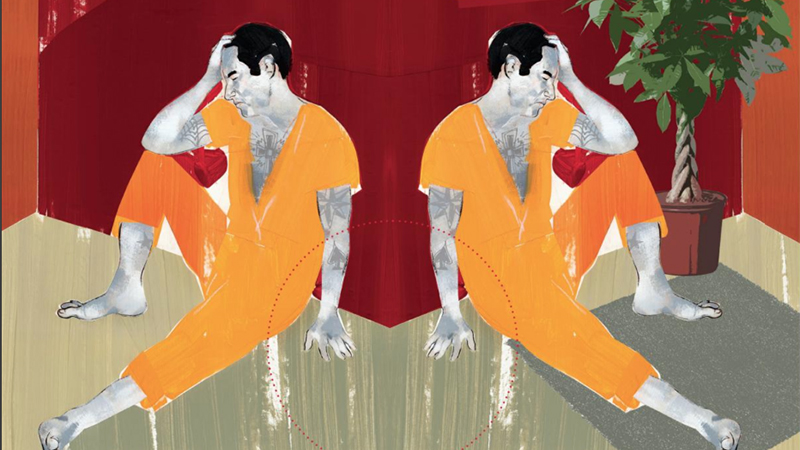
By Tony Moore
Turn on any news broadcast, scroll through any newsfeed or pick up any newspaper, and the troubling headlines are overwhelming: another controversial police shooting, surging incarceration rates among people of color, the latest inner-city drug raid. Increasingly, social justice problems overlap with criminal justice problems, and making a difference in either realm means digging beyond individual stories and attacking policy issues at their roots.
But how do you connect the dots between state regulations and a young mother facing jail time because she skipped a meeting with her parole officer to go to work? How do you link the latest sociological research with a black teenager who just got pulled over and is too scared to get out of his car? How do you avoid getting mired in the minutiae of politics, while also keeping sight of the people behind those troubling headlines?
As recent alumni can attest, these are exactly the questions the Heller School tries to answer in its master’s in public policy (MPP) program.
“The program takes on social policy with a focus on expanding opportunity and understanding exactly how programs and policies impact people,” says Michael Doonan, PhD’02, associate professor and MPP program director. “What sets Heller apart is our focus on, and dedication to, using knowledge to advance social justice. We are not only strong in academic rigor but also in applying that rigor to address the most difficult social policy challenges.”
One graduate doing just that is Derek Lowry, MPP’16, a policy analyst for community initiatives, corrections and re-entry at the Council of State Governments’ Justice Center in New York. The challenge Lowry faces is a daunting one. Currently, the National Institute of Justice estimates that more than half of all released prisoners are re-arrested within a year of leaving prison. In three years, that figure shoots up to 67 percent. In five, it surpasses 75 percent. All of which is to say that you can’t tackle the U.S. mass incarceration problem without digging into the issue of re-entry and the host of systemic flaws that can turn even a short prison sentence into a lifetime relationship with the criminal justice system.
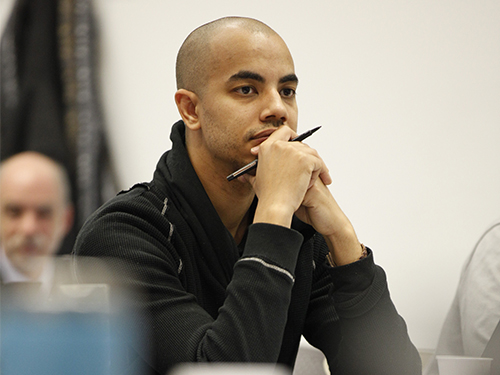
“The punishment doesn’t really end after an individual has served his or her time,” Lowry explains. “Instead, the punishment persists through the negative labeling affixed to them upon their release, the restrictions and taboos thrust on them when they return to their communities and the way the industry profits off their despair.”
To combat this persistent punishment, Congress passed the Second Chance Act (SCA) in 2008, which authorized federal grants for programs, nonprofits and reforms aimed at reducing recidivism. But laws alone don’t bring change. Getting the SCA to deliver means identifying how to best aid the re-entry process and fight recidivism.
That’s where Lowry comes in. Using research skills he honed at Heller, he works with organizations receiving SCA grants to identify evidence-based best practices and develop programs that most effectively help released prisoners re-integrate into society.
“Heller was incredibly instrumental in elevating my ability to work on criminal justice reform and systems reform,” says Lowry. “The program helped me adopt and cultivate a more nuanced perspective on several big issues — social welfare, education policy, private vs. public interest.”
In fact, Lowry’s most dynamic work — leading a countywide evaluation of an underperforming re-entry system in Buffalo, New York — is a direct outgrowth of his experience at the Heller School. That evaluation process has him tracing the flow of re-entry populations, identifying funding streams and analyzing how effective agencies, community organizations and nonprofits are at helping former prisoners find their footing — exactly the kind of work he learned to take on during his two years in the MPP program.
“I was made the lead on the project because of prior mapping work I’d done … at the Sillerman Center for the Advancement of Philanthropy and because of a report I’d written for the Department of Education during a brief stint I had in the Office of Career, Technical and Adult Education through a fellowship while still a student [at the Heller School],” he explains.
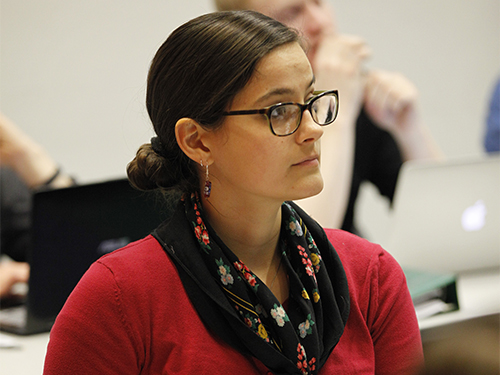
Like Lowry, fellow alumna Leah Sakala, MPP/MBA’17, is using her Heller education to fight inequality by addressing mass incarceration. As a research associate in the Justice Policy Center at the Urban Institute, she probes sentencing structures, corrections policy, and juvenile and criminal justice practices to support reforms that strengthen communities.
“Inequities in the criminal justice system are inherently linked with larger social, political and economic structures that limit opportunity,” explains Sakala, who was a senior policy analyst at the Prison Policy Initiative before earning her dual master’s at the Heller School. “It’s clearer than ever that no policy issue exists in a bubble, and those of us working on improving social policy have to be ambitious about collectively identifying and addressing root causes.”
Sakala notes that courses like University Professor Anita Hill’s “Social Justice and the Obama Administration” challenged her to be bold and creative in envisioning solutions to social problems while remaining pragmatic and grounded about the policy changes needed to reach those solutions.
“Coming back to graduate school at Heller after working in the justice policy field for a few years was a great opportunity to take a step back and explore the intersections between criminal justice and other social policy spheres,” she says. “Heller faculty members are an incredible resource, and I finished the program with a more robust toolkit for analyzing and influencing policy decisions … I draw on skills I honed just about every day.”
Sakala’s experience is fairly typical in the MPP program, where many students enroll in the Heller School to give them the tools to impact policy on a larger scale.
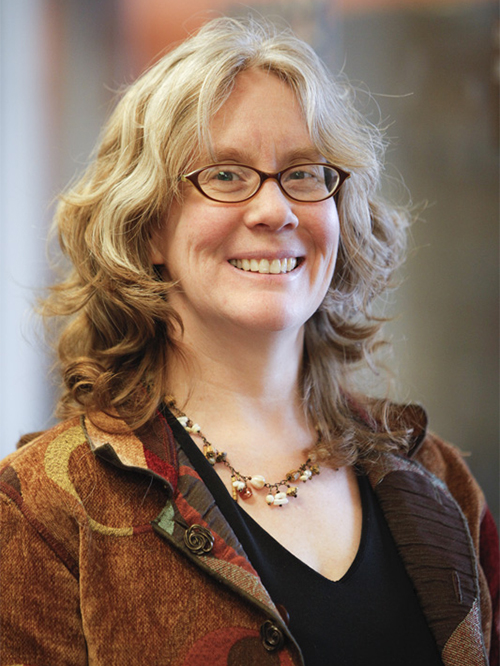
“The MPP program takes people who have some experience and a commitment to improving the world, gives them a strong foundation in policy analysis and builds their commitment to helping our most vulnerable populations,” says Mary Brolin, PhD’05, a scientist and lecturer who teaches the MPP capstone course. “Many of our students come in with experiences where they’ve helped people one-on-one. But they often realize they are at a disadvantage because of the larger systemic problems these individuals face. The Heller MPP program builds our students into professionals who can lead policy changes that address these systemic barriers to impact larger populations.”
That was the case for Abigail Strait, MPP’16, who came to Heller after doing a post-college internship that involved working in a prison. At Heller, she honed her research and policy analysis skills while focusing on criminal justice with a concentration in poverty alleviation. Today, she is an associate at the Crime and Justice Institute, where she harnesses hard data to help states more effectively implement new criminal justice reforms.
“Heller’s MPP program helped me learn to think more critically about policy and helped me develop skills that have been essential in my job,” says Strait. “For example, I was never that interested in stats, but at Heller I learned how to think about, interpret and talk about statistics. This proved to be just what I needed postgraduation.”
This knack for connecting research and analysis with hands-on experience continues to draw students to the program. James Conlon, MPP’18, currently in his second year of the MPP program, has his sights set on becoming a policy director in the area of policing. His career goals include making police more accountable for their use of force and highlighting problems with questionable practices like “broken windows policing” and stop-andfrisk practices. Rather than looking to a traditional criminal justice master’s program, Conlon chose the Heller MPP for its holistic, interdisciplinary approach.
“I wanted an MPP from Heller because of its emphasis on intersectionality,” Conlon explains. “Criminal justice policy does not belong in a silo. At Heller, I can meet and network with students and faculty who have a wide range of interests closely linked to mine. … I was drawn to Heller’s mission for social justice through data-driven research and advocacy.”
Conlon’s recent coursework and internship with the Inspector General’s Office in Los Angeles have given him a firsthand understanding of the many issues that intersect with criminal justice. After taking courses that discussed the contemporary role of policy analysis and the stakeholders involved in policymaking decisions, Conlon took part in a police ride-along in South Los Angeles, conducted use-offorce investigations, penned a policy best practices report on Taser deployment, helped design a matrix for stop-and-frisks, and met with the city’s chief of police and other key stakeholders in policing policy.
“Heller has opened doorways to me and given me the skills and confidence to help people through policy analysis,” he says.
Just as important as those open doorways, however, are the people holding the doors open. As Conlon puts it, “Although the coursework may be important, faculty are just as critical to the student’s individual learning process. … The professors at Heller are passionate about their coursework and want to see students care too.”
Lowry, Sakala and Strait agree, noting that interacting with faculty who are committed to social change helps them link their academic work with the wider world. For Lowry, that’s epitomized in Visiting Professors Robert Kuttner and Deborah Stone.
“Both of them approach the work they do with a calm rationality and expert knowledge that I found inspirational every day,” Lowry explains. “They allowed me to bounce my ideas off of them and guided me toward reading material that enhanced my beliefs, ethics and knowledge base.”
Alumni also note an admiration for Brolin, who in addition to teaching in the program has worked in the substance abuse field for 27 years. Her work seeks to destigmatize alcoholism and addiction, reveal the flaws in the criminal justice system’s approach to substance abuse, and increase opportunities for addiction screening and treatment. In recognition of her research, Brolin earned a Section Leadership Award from the American Public Health Association’s Alcohol, Tobacco and Other Drug Section and was a finalist in the Robert Wood Johnson Foundation’s Developing Leadership in Reducing Substance Abuse Program. At Heller, her work has also helped show students how academic research can play a vital role in taking on national crises.
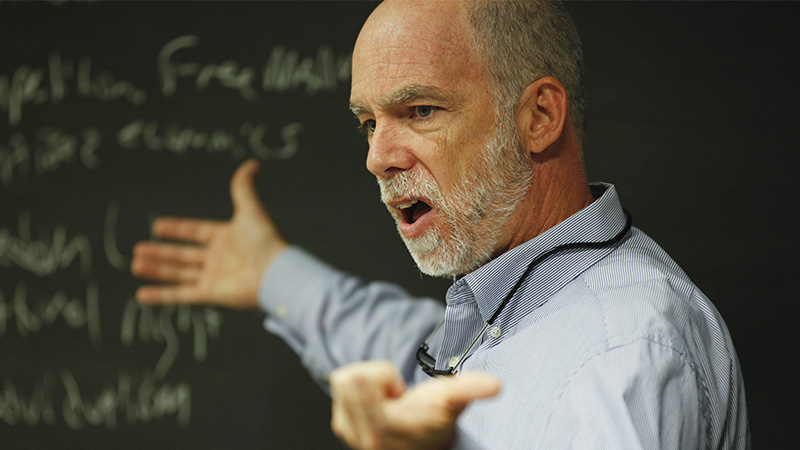
“Mary has been a leader in this field for the last two decades,” says Doonan. “She is an invaluable resource not just to Heller and the MPP program but also to making progress on one of the most critical issues facing the nation.”
As Brolin attests, she’s far from the exception among Heller faculty, who all seek to connect their scholarship with relevant, real-world issues. “Our research does not sit on shelves,” she says. “The faculty and research staff at Heller work closely with local, state and federal policymakers and practitioners so that we are asking cutting-edge questions and providing findings that are used to inform policies and program improvements.”
As daily headlines remind us, these improvements are sorely needed. The statistics are startling. Over the last 40 years, the U.S. prison population has ballooned from roughly 500,000 to over 2.2 million. Today, though the U.S. accounts for only 5 percent of the world’s population, it accounts for more than 20 percent of the global prison population. What’s worse is that the prison population is far from an accurate representation of the country’s racial makeup. The NAACP estimates that African Americans and Hispanics account for just over 30 percent of the U.S. population but over half of U.S. prisoners.
With mass incarceration and racial disparity so deeply entrenched in the system, there are no silver-bullet solutions. Making a difference means rolling up your sleeves and digging into the network of policy, implementation and regulatory issues that undergird the system itself.
“There is no single panacea that will help us chart a new course,” Sakala says. “We need to press forward with policy and practice reform throughout and beyond the criminal justice system, ranging from policing and sentencing reform all the way to more equitable access to health care, living-wage jobs and affordable housing. The social and economic cost of maintaining the status quo is just too high.”
This article originally appeared in the Winter 2017 issue of Heller Magazine.
